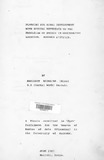| dc.contributor.author | Wainaina, Margaret | |
| dc.date.accessioned | 2014-05-27T07:35:51Z | |
| dc.date.available | 2014-05-27T07:35:51Z | |
| dc.date.issued | 1985-06 | |
| dc.identifier.citation | Master of Arts In (planning), University of Nairobi,1985 | en_US |
| dc.identifier.uri | http://hdl.handle.net/11295/68010 | |
| dc.description.abstract | The maln focus of the study is on the role energy
plays in rural development.
Kenya continously recognises the role played by
rural areas in national development and therefore
the study examines the current energy situation in
the location with respect to the various linkages
energy has with other basic needs. The study underlines
such aspects as accessibility, availability, quantities
and qualities of woodfuel and location of areas as
important in the acquisition of woodfuel.
The study also establishes that energy supply is a
constraint in the rural development process. It is
shown that the problem of rural development in the
location revolves around the predominance of agriculture
in a situation of land scarcity and fragmentation in
the face of increasing population. It is argued that
before rural development can advance sufficiently to
absorb surplus rural populations the aim of rural development
should be to efficiently organise resources so that
they can irtcreasingly contribute to comprehensive
development in the rural areas. The study also shows
that the provision of energy takes away a big 'portion
of family incomes and this creates a conflict with the
provision of other basic needs.
The study also shows that increased cultivation of the
land and increased population growth and consequent
land fragmentation has led to poor agricultural production
The study has found that people are increasingly walking
longer distances to get fuelwood. They are using
inferior types of fuelwood and indeed agricultural
residues and this further contributes to low agricultural
production. Further it has been found that fuelwood will
continue to be important in the location at least
in the short run.
The study has also underlined the need for development
without destruction. Towards these problems the
study has proposed and recommended ways of maximising
on the utlisation of existing resources within the
study area through conservation. Measures that are
suggested include:- agroforestry, family planning and
fuel substitution amongst others.
The study also calls on the Government to subsidise
the pri ce of "jikos" in order to allow for faster'
diffusion of the technologies because presently the
prices of the "jikos" are beyond the economic capability
of the people. It also calls on the government to
train more agricultural personnel especially for followup
purposes. The study further calls for the strengthening
of the service centre strategy to enhance rural development.
The study finaly suggests follow up research | |
| dc.language.iso | en | en_US |
| dc.publisher | University of Nairobi | en_US |
| dc.title | PLanning For Rural Development With Special Reference To The Provision Of Energy In Gaichanjiru Location. Muranga District | en_US |
| dc.type | Thesis | en_US |

